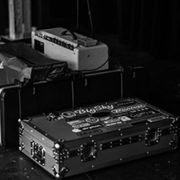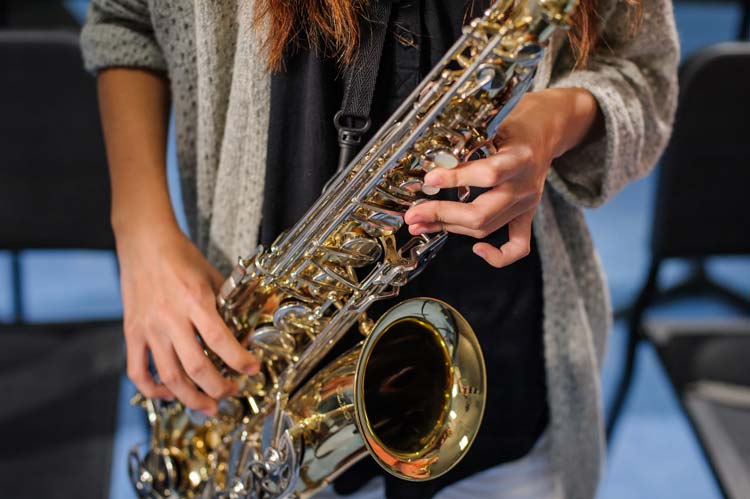July 06, 2015
Upgrading Your Instrument & Gear? Here’s What to Do with Your Old Stuff


Whether you’re upgrading your gear or moving onto another instrument altogether, you might be wondering what you should do with your old stuff. Sure, you can let it collect dust in the basement or keep it around the house “just in case” you change your mind, but musical instruments, recording equipment, and accessories tend to hold their value surprisingly well, so selling it might make more sense.
Even if you decide not to sell your gear, there’s still other ways to get rid of your gear that’ll allow someone else to enjoy them while freeing up some space in your home or studio. And, at the end of the day, who couldn’t use a little extra space? From online classics to new options, here are a few different things you can do with your old musical gear.
First, Do Some Leg Work
Before you can sell your instrument for hundreds (or thousands!) of dollars, you’ll need to do a little work. If you really want to get a reasonable price for your gear, don’t just toss some mediocre photos on Craigslist, cross your fingers, and hope for the best. Instead, do some research and find the going rate of your instrument/gear. If you can’t find what you’re looking for online, you can head to a professional music store for an expert’s opinion. In addition to finding the value of your gear, they’ll be able to :
- Perform any repairs necessary before selling
- Give your instrument a deep cleaning so it looks sparkling clean for the photos
- Advise you on the best places to sell your instrument
- BONUS: They may even be willing to make an offer on your instrument themselves!
Take Good (& Honest) Photos
Once your instrument is repaired and super clean, it’s time to take photos. If you don’t have a high-quality camera, ask around to see if you can borrow one. If you can’t seem to get your hands on on, consider renting one from a professional camera store. Depending on the store, you might be able to rent the camera for an hour or two, which could save you money. Here’s some tips for taking great photos of your instrument:
- Use a plain backdrop, like a white wall
- Use a tripod
- Don’t use flash
- Take full-size shots and close-ups of the important details (including flaws and damage!*)
- Use high-resolution camera settings
- If you need to, compress photos later using free software
*It might seem counterintuitive to include scratches, dents, and other damage in the photos, but you don’t want to deceive buyers. The more honest you are with your listing, the quicker you’ll find an interested buyer. The last thing you want is to list your instrument as being in mint condition when it’s anything but.
Where to Sell Your Instrument
If you took your instrument in to a professional repair shop and they gave you some ideas on where to sell your instrument, great! If that statement doesn’t apply to you, that’s OK–we’ve got you covered. There are a number of online and IRL venues to consider when deciding where to sell musical instruments and equipment. If you do decide to sell online, photography is key. Bad photos will ruin any chance you have to get a good price for your instrument, so remember to use our tips above to take photos. Without further ado, here are a few different ways to sell your instrument:
- eBay–A perennial favorite, eBay is a trusted place to sell pretty much anything, instruments included. It does cost money to list and sell on eBay, so if you’re looking for a free option feel free to skip this one. One of the great things about eBay, though, is that you can sell internationally and they even offer a comprehensive guide to selling your instrument on eBay.
- Local papers–If your city or town has their own publication, consider taking out an ad in the next issue. Not only is this a great way to reach a big audience, but everyone who sees your ad will live close by, meaning you won’t have to go out of your way to meet an interested buyer halfway. Depending on the sophistication of your city’s publication, taking an ad might even get you an accompanying online ad free of charge.
- Craigslist— Like eBay, Craigslist is a very trusted online marketplace. Even better, you can list items for free, meaning there’s no financial burden to use the platform. Over 10,000 musical instruments are bought and sold on Craigslist each day, making it an excellent opportunity for selling locally. You can even keep re-listing your item for free until you find a buyer.
- Brick and mortar stores--Before the internet, physical music stores were one of the only places one could go to to sell their instrument. Many stores, like Guitar Center, still allow visitors to walk in, get their instrument valued, and make a sale right then and there. This is definitely the lowest-hassle option, since you won’t have to take photos, create a listing, or keep an eye on your email for someone that wants to purchase your instrument.
- There’s an app for that— Nowadays, there’s an app for pretty much everything–including selling your old gear. eBay even has their own app for selling, called Close5. With the app, you can select distance limits (1 mile, 5 miles, etc.) and only people within that vicinity can see your listing. It’s like the next generation of Craigslist, and it’s one of many apps designed to help you sell stuff.
Consider Donating
If you’re in a rush or want to feel good about giving back to the community, consider donating your instrument and gear. Non-profit organizations like Hungry for Music and Mr. Holland’s Opus will take your gently-used instrument and donate them to schools, so kids who can’t afford an instrument of their own can still learn how to play an instrument. Isn’t that great? We think so!
Disclaimer: if you’re under 18, talk to your mom, dad, or guardian before listing an instrument on eBay or Craigslist or before taking out an ad in your local paper or downloading apps. Websites like eBay and Craigslist don’t even let you list items if you’re under 18, so your mom, dad, or guardian will need to list the item in their name, anyways.







